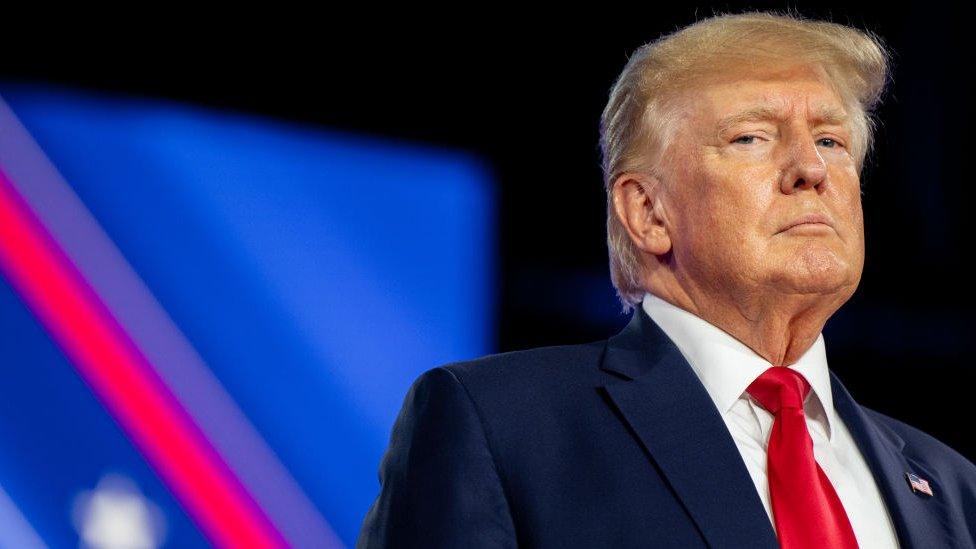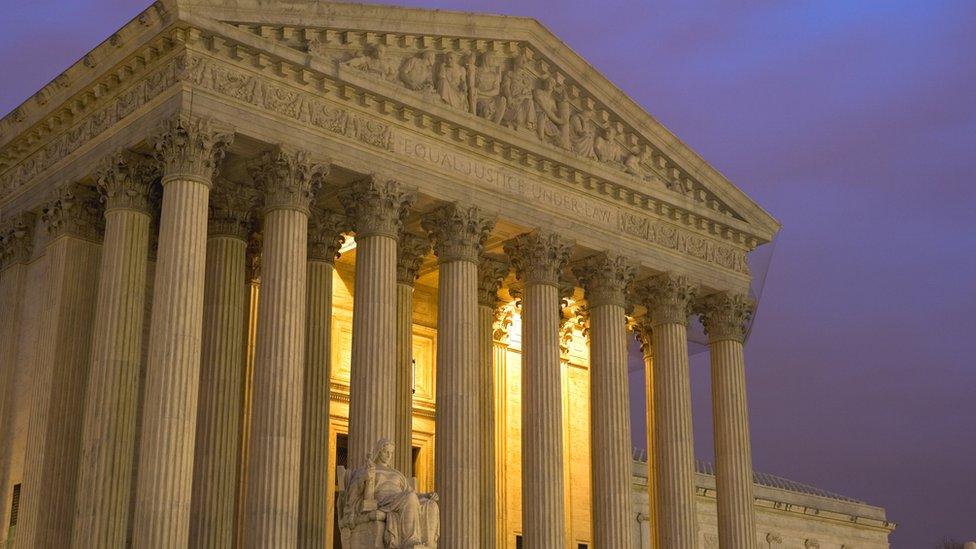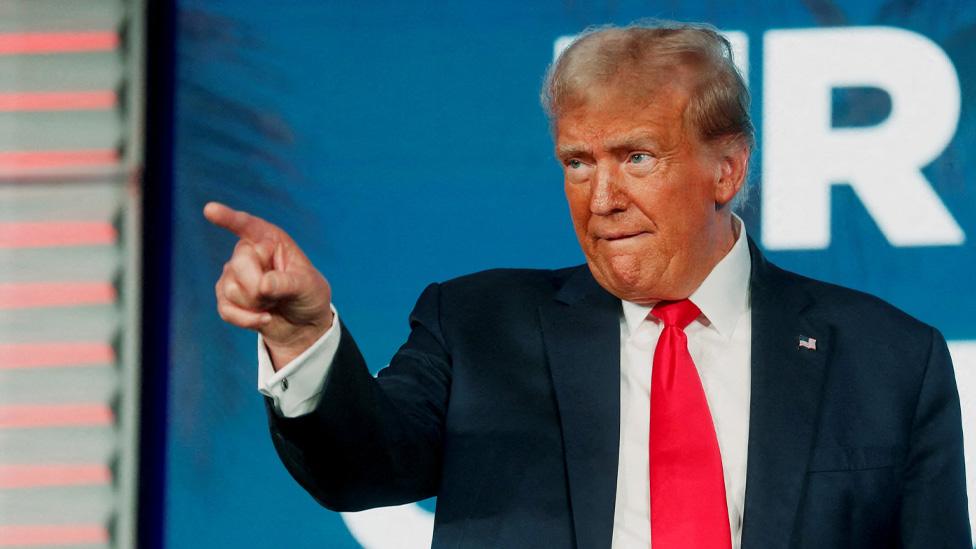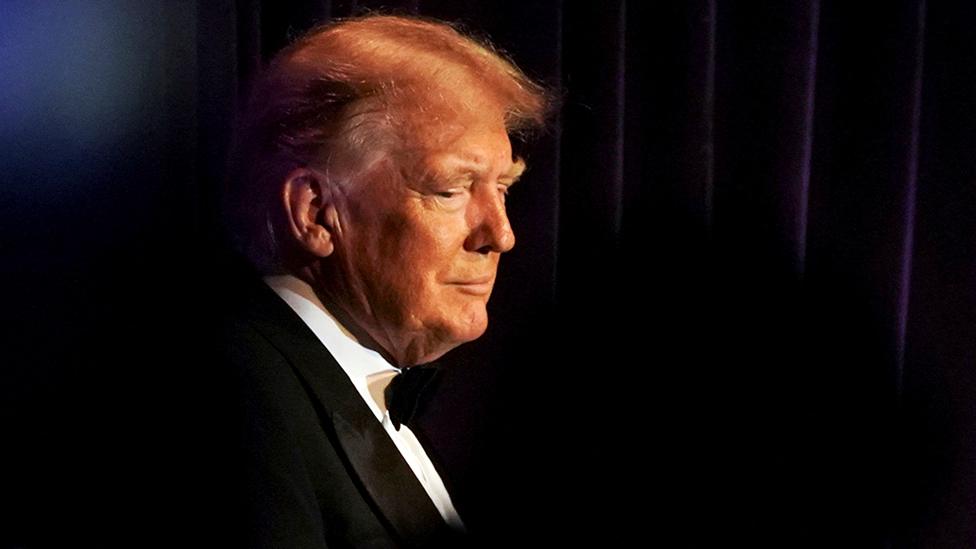Shenna Bellows: Top Maine election official defends taking Trump off ballot
- Published
Watch: Maine's top election official explains why she removed Trump from ballot
Maine's top election official said her "sacred obligation" to uphold the law drove the ruling to remove Donald Trump from the state's 2024 election ballot.
Secretary of State Shenna Bellows cited the US Constitution's insurrection clause to remove Mr Trump, noting his role in the 2021 US Capitol riot.
The Democrat told the BBC she was hopeful the US Supreme Court will settle the issue.
The Trump campaign has vowed to appeal the controversial decision.
Two states, Maine and Colorado, have now banned the former president from the electoral ballot. Both decisions are on hold, however, until legal challenges make their way through the courts.
Steven Cheung, a spokesman for the Trump campaign, has described both Maine and Colorado's decisions as election meddling. He said on Thursday that the rulings were "a hostile assault on American democracy".
Mr Trump's opponents for the Republican nomination and some legal experts also criticised the ruling, but Ms Bellows maintained that she followed the law and the evidence presented to her.
Ms Bellows says in her order, published on Thursday, that Mr Trump must be removed from the state's Republican primary ballot because of the 14th Amendment's insurrection clause. She told the BBC that her "political affiliation or prior experience" played no role in the decision.
This section of the constitutional amendment, which is historically tied to the end of the US Civil War, prevents anyone who has "engaged in insurrection or rebellion" from holding federal office. Ms Bellows' order cites Mr Trump's efforts to push a months-long "false narrative of election fraud" ahead of the 6 January riot as justification for his removal.
Under Maine law, any registered voter can challenge a candidate's qualifications to be on the ballot. In Mr Trump's case, the challenge came from three former state senators - two Republicans and a Democrat.
"That requires me, under Maine election law, to hold an administrative hearing to review the evidence and the facts," Ms Bellows told the BBC, adding that both sides were represented by attorneys. "I was then required to review that evidence and hearing record, the law and the Constitution ultimately. That is my sacred obligation."
"It's my duty to uphold the Constitution," Ms Bellows added.
Ms Bellows - a Democrat - acknowledged the unprecedented nature of her decision in the order, writing that she is "mindful that no Secretary of State has ever denied a presidential candidate of ballot access based on Section 3 of the 14th Amendment of the Constitution".
She added in the ruling that she is "also mindful, however, that no presidential candidate has ever engaged in insurrection".

Donald Trump's campaign has vowed to appeal the Maine decision.
The Maine ruling will not take effect until the potentially lengthy legal appeals process is finished. The decision will now be reviewed by state courts and could ultimately go to the Supreme Court.
On Wednesday, the Colorado Republican Party appealed a similar ruling in that state, setting the stage for a legal battle that could also wind up in the Supreme Court. Until the matter is legally resolved, Mr Trump will remain on the state's ballot.
According to Ms Bellows, a Supreme Court decision in the Colorado case could also be "determinative" in Maine.
Her decision, however, has come under fierce criticism from both the Trump campaign and from other Republicans, including some of the former president's rivals in the party.
"It opens up Pandora's box," Florida Governor Ron DeSantis, another contender for the Republican nomination, said on Fox News after the Maine decision was announced. "Can you have a Republican secretary of state disqualify Biden from the ballot?"
Joe Moreno, a former federal prosecutor, told the BBC that it was "breathtakingly arrogant" for Mrs Bellows to "unilaterally" decide Mr Trump committed insurrection, despite the lack of a criminal conviction.
"There's no way this holds up under any judicial scrutiny," he added.
BBC News pressed Ms Bellows on her decision and its effect on voters in the state who intended to cast their ballot for Mr Trump.
The Maine Secretary of State maintained, however, that she was "duty bound" to remove the former president from the ballot based on the evidence presented to her.
Related topics
- Published22 December 2023

- Published5 January 2024

- Published28 December 2023
